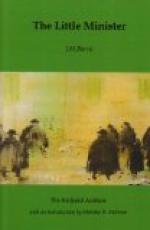“It may come down at any minute,” the farmer answered, “and syne, mind you, you’ll be five miles frae Waster Lunny, for there’ll be no crossing but by the Brig o’ March. If you winna come, I maun awa back. I mauna bide langer on the wrang side o’ the Moss ditch, though it has been as dry this month back as a tabbit’s roady. But if you—” His voice changed. “God’s sake, man,” he cried, “you’re ower late. Look at that! Dinna look—run, run!”
If I had not run before he bade me, I might never have run again on earth. I had seen a great shadowy yellow river come riding down the Quharity. I sprang from it for my life; and when next I looked behind, it was upon a turbulent loch, the further bank lost in darkness. I was about to shout to Waster Lunny, when a monster rose in the torrent between me and the spot where he had stood. It frightened me to silence until it fell, when I knew it was but a tree that had been flung on end by the flood. For a time there was no answer to my cries, and I thought the farmer had been swept away. Then I heard his whistle, and back I ran recklessly through the thickening darkness to the school-house. When I saw the tree rise, I had been on ground hardly wet as yet with the rain; but by the time Waster Lunny sent that reassuring whistle to me I was ankle-deep in water, and the rain was coming down like hail. I saw no lightning.
For the rest of the night I was only out once, when I succeeded in reaching the hen-house and brought all my fowls safely to the kitchen, except a hen which would not rise off her young. Between us we had the kitchen floor, a pool of water; and the rain had put out my fires already, as effectually as if it had been an overturned broth-pot. That I never took off my clothes that night I need not say, though of what was happening in the glen I could only guess. A flutter against my window now and again, when the rain had abated, told me of another bird that had flown there to die; and with Waster Lunny, I kept up communication by waving a light, to which he replied in a similar manner. Before morning, however, he ceased to answer my signals, and I feared some catastrophe had occurred at the farm. As it turned out, the family was fighting with the flood for the year’s shearing of wool, half of which eventually went down the waters, with the wool-shed on top of it.
The school-house stands too high to fear any flood, but there were moments when I thought the rain would master it. Not only the windows and the roof were rattling then, but all the walls, and I was like one in a great drum. When the rain was doing its utmost, I heard no other sound; but when the lull came, there was the wash of a heavy river, or a crack as of artillery that told of landslips, or the plaintive cry of the peesweep as it rose in the air, trying to entice the waters away from its nest.




